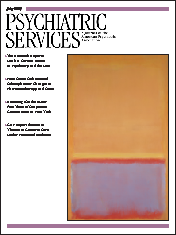A Confidential Peer-Based Assistance Program for Police Officers
Posttraumatic stress is an understandable complication of police work. Despite stereotypes that portray police officers as heroic and invincible, about one-third of police officers who are exposed to diverse work-related traumatic events develop significant posttraumatic stress symptoms. Many suffer from additional complications, including high rates of alcohol abuse, marital and family problems, domestic violence, and suicide.
Police officers with psychological or personal problems are reluctant to seek assistance from internal departmental services. Fears of stigmatization, adverse job consequences (such as modified work assignments, altered career paths, or loss of one's weapon), and perceptions of personal weakness or failure prevent police officers from seeking help. As a closed group, police officers are unwilling to share their problems with mental health professionals, who are seen as outsiders who cannot understand police culture.
After 26 suicides in the New York Police Department (NYPD) over two years (1994 and 1995), it was determined that a confidential, nondepartmental assistance program was needed to assist NYPD officers. In addition, peers would be needed to help officers overcome the personal and cultural barriers to seeking professional assistance. With the endorsement of the NYPD and Police Unions, the Police Organization Providing Peer Assistance (POPPA) was created.
POPPA is a confidential, voluntary, independent, nondepartmental assistance program for the NYPD that uses trained volunteer NYPD officers as peer support officers. Volunteers have been recruited and trained from all ranks and backgrounds of the NYPD. Since 1995 POPPA has run a 24-hour help line. An officer can call any time about any personal or job-related stress problem and talk to a trained volunteer peer support officer. Calls are self-referred, and all assistance is voluntary. Within 24 hours (the same day if necessary), the peer support officer will meet with the officer face to face. About 75 percent of calls to the help line result in a face-to-face peer meeting.
To protect privacy, such meetings take place outside departmental facilities, and no records are maintained. The peer support officer provides an empathic ear and screens for major safety issues, such as suicidal or homicidal ideation, alcohol abuse, and risk of violence. The peer support officer also helps the officer accept that a personal or stress-related problem is not a sign of weakness or personal failure. Asking for help is discussed as a sign of strength. Often this peer meeting provides the support that officers need to be able to use their own personal resources to cope more effectively.
When necessary, the officer is provided with a referral to a mental health professional who is trained and experienced in working with police officers. Peer support officers do not provide ongoing counseling. Their role is to screen, support, and act as a bridge toward professional assistance. Clients who need further assistance are advised to see a professional. The responding peer support officer discusses each call and referral with a senior peer team coordinator who has several years of experience working with POPPA. All at-risk or questionable cases are reviewed with the clinical director, a retired police officer and C.S.W., and, when needed, with the medical advisor, a psychiatric physician.
POPPA has developed and trained a panel of more than 110 independent mental health professionals in New York City and the surrounding counties. Alleviating fears of job-related consequences, all assistance provided is confidential and is not reported to the NYPD. Officers of the NYPD have gradually accepted POPPA's peer support officers and the reality that sometimes even they need assistance for personal problems. In the first year, there were about 250 calls to the help line. Since 2001, the number of calls has increased to between 900 and 1,200 per year. The proportion of callers who accept a referral for professional assistance has also increased, from about 30 percent to 45 percent of callers. Because of confidentiality issues, detailed information is unavailable. However, the primary reasons for calls over the years 2003 and 2004 were in the areas of stress or anxiety (34 percent), alcohol problem (26 percent), marital problem (24 percent), traumatic stress (18 percent), depression (14 percent), and bereavement issues (7 percent).
It is encouraging to see that many police officers can overcome stigmatization issues and view mental health problems as normal complications of their work that can be addressed. Other emergency services and professional organizations whose members also fear the consequences of seeking assistance—such as physicians, nurses, and other mental health professionals—may also benefit from a similar independent, voluntary, confidential peer-based assistance program.
The authors are affiliated with Police Organization Providing Peer Assistance (POPPA), 26 Broadway, Suite 1640, New York, New York 10004-1898 (e-mail, [email protected]). Dr. Dowling is also assistant professor of psychiatry at the State University of New York at Stony Brook.



